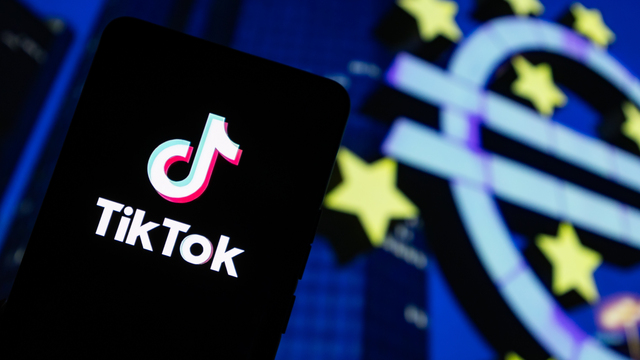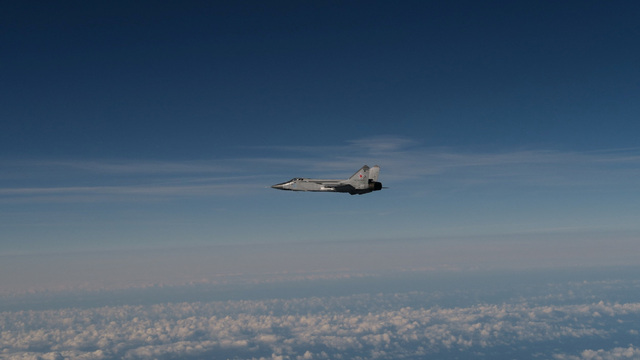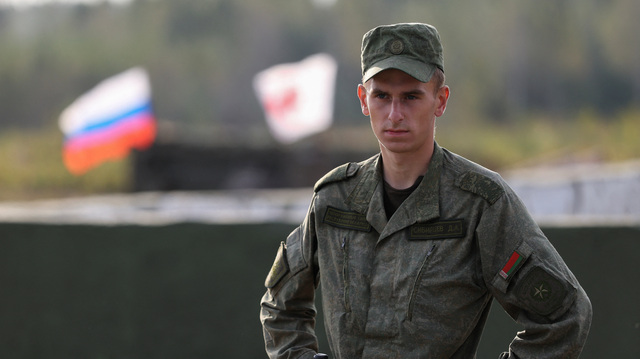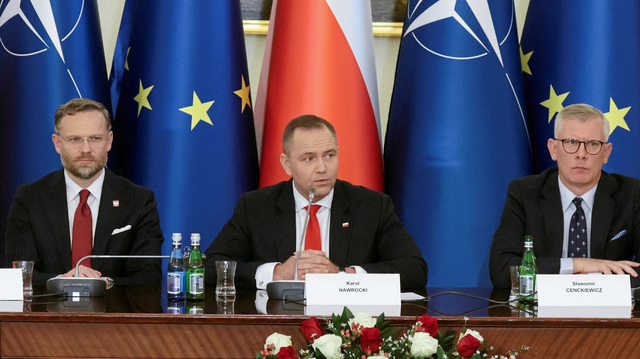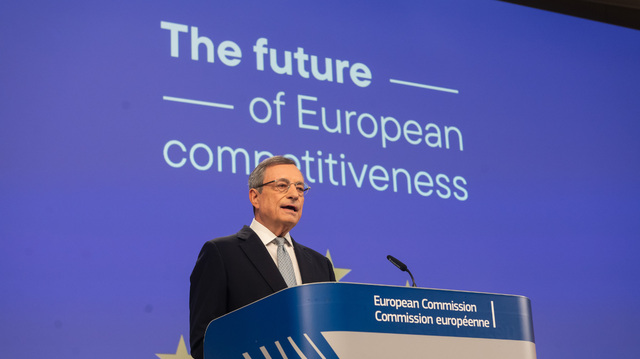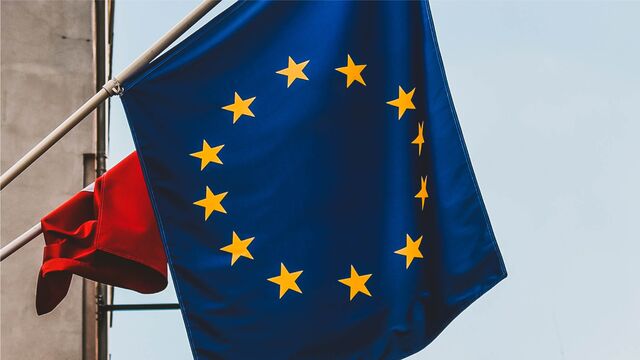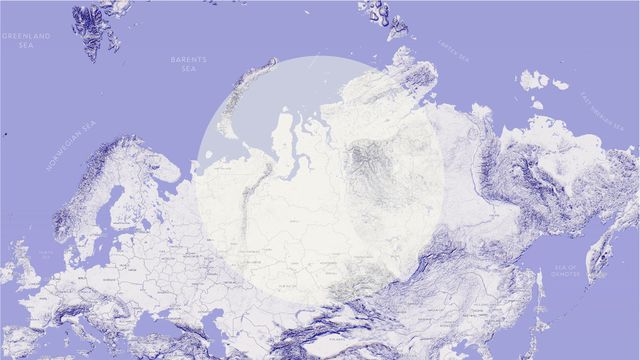Time to Exist and Resist: The European Union and Russian Political War
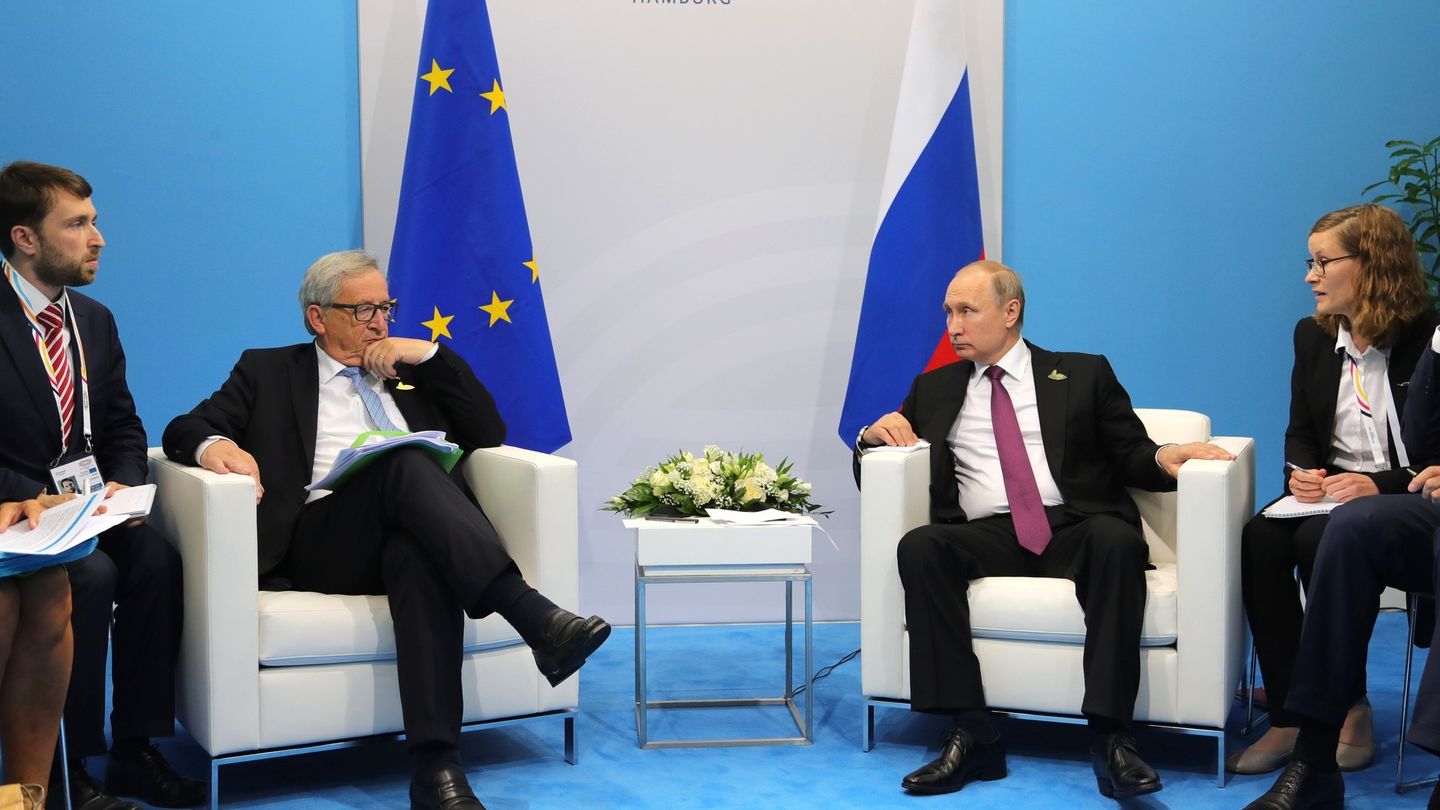
paper
Mark Galeotti, Senior Nonresident Fellow of the Institute of International Relations, published a new Policy Paper about the political war between the European Union and Russia.
In March 2019, the European Parliament formally voted on a resolution that “Russia can no longer be considered a strategic partner.” This was a non-binding political resolution, though, and it is still unclear what is behind the EU’s Russia policy. A particular problem in formulating EU-wide responses to Russian political war is the breadth of opinion between member states and organizational culture – and often institutional requirement – for consensus or unanimity.
MARK GALEOTTI - summary and recommendations
Russia is waging a political war campaign of active measures intended to divide, distract, and dismay European states, not as a prelude to any direct military aggression but as a substitute.
The institutions of the European Union have made very patchy and often reluctant responses to this campaign, in part as a result of a lack of consensus among member states, in part because the necessary measures – which often focus on cohesion, legitimacy, and more effective counter-intelligence activity – are controversial, complex, long-term and expensive.
A primary issue, though, is the dramatically different strategic cultures and operational codes of the EU and Russia. Moscow subscribes to an essentially confrontation, zero-sum perspective that at best interprets the EU’s more inclusive approach as naive, at worse as a pose, concealing malign intent.
The EU and member states need to appreciate and understand the nature, scale and objectives of Russia’s political war, and specifically the lack of any set doctrine or “playbook.” This will require deeper investment in expertise within the institutions of the Commission, as well as broadening European understandings of “security.”
Addressing issues of corruption, institutional legitimacy, social cohesion and governance is a crucial security concern. Countries at most risk from the ‘legitimacy gap’ are more vulnerable to Russian interference and subversion.
The EU must appreciate that as an alliance, weaknesses in the counter-intelligence capacities of one state is a vulnerability for all. There needs to be greater effort on this, and a consensus on the minimum level of acceptable spending on this.
The immediate challenge is to act more decisively and collectively to reduce the effectiveness of the instruments used by Moscow in its political war, especially those not simply operating on direct instructions but “adhocrats” seeking to please Moscow. This requires more detailed intelligence gathering, analysis and sharing, which could fall within the remit of INTCEN.
The EU needs to adopt a deterrent posture to political warfare that is smart, asymmetric and above all collective. This means both punishing Moscow for its transgressions and also making adventures less tempting, while avoiding the temptation of “Russia-bashing.” It must be made clear that the EU has a problem not with “Russia” but with specific actions carried out by a specific regime.
Policy paper
“At the best of times, the Kremlin does not really believe
the European Union is a thing, that it exists. When
it comes to asserting power, to defending itself from
threats, whether military or hidden, even less so.”
Former Russian foreign service officer, 2017
When viewed through the very specific prism of modern Russian geopolitical thinking – in which everything is a zero-sum game of influence and power – it is perhaps possible to understand why it has this disregard for the European Union as a collective body. Certainly in this area it has yet to live up to its promise to be more than the sum of its parts. This report will seek to explore and explain the EU’s lack of success to date in mobilising a serious and coherent response to the Russian challenge, before laying out broad recommendations intended to help resist it and, in the process, maybe even persuade the Kremlin that it exists.
THE CHALLENGE
Security debates about a potential challenge to the West from Russia have in recent years been dominated by such faddish, ambiguous and ultimately unhelpful terms as “hybrid war,” “the Gerasimov doctrine,” “grey-zone warfare” and – appropriately enough – “ambiguous war.” A central challenge is whether or not – as in Crimea and the Donbas – the use of non-military means such as disinformation and subversion is a prelude to eventual military action. Despite periodic alarums, often in response to Russian military exercises or especially inflammatory Kremlin rhetoric, there is no serious evidence to suggest that Vladimir Putin has either territorial claims to the west, nor any desire to trigger an open and direct conflict with Europe.
Instead, the contention here is that the non-kinetic measures in this case are not a complement to military action, but a substitute for it.4 In this respect, Moscow's approach is best characterised as “political warfare,” described by George Kennan, architect of the USA’s Cold War strategy, as “the logical application of Clausewitz’s doctrine in time of peace. In broadest definition, political warfare is the employment of all the means at a nation’s command, short of war, to achieve its national objectives. Such operations
are both overt and covert. They range from such overt actions as political alliances, economic measures…, and ‘white’ propaganda to such covert operations as clandestine support of ‘friendly’ foreign elements, ‘black’ psychological warfare and even encouragement of underground resistance in hostile states.”
In other words, the Kremlin has opted to use “all the means at a nation’s disposal, short of war” in an effort to divide, distract and demoralise the West in general, and arguably Europe in particular, in pursuit if its wider strategic objectives: having its claims to great power status recognised; asserting a sphere of influence including Ukraine, Belarus and Georgia; and pushing back against efforts to influence its domestic and international policies through sanctions and suasion. To this end, the EU faces a campaign of opportunistic Russian “active measures” – covert political subversion – intended to prevent it from resisting Moscow’s wider political agenda. Against this campaign, in the words of an admittedly Eurosceptic British security official, “the EU is nowhere, simply nowhere.”
EU POLICY
In March 2019, the European Parliament formally voted on a resolution that “Russia can no longer be considered a strategic partner.” This was actually a non-binding political resolution, though, and it is still unclear what is behind the EU’s Russia policy. To a considerable extent, it has become hijacked by the – admittedly important – question of the Ukrainian conflict. Since 2016, EU member states have formally been committed to five guiding principles for common policy towards Russia: insisting on full implementation of the Minsk Agreements on Ukraine; pursuing closer relations with other former Soviet states; strengthening European resilience to Russian threats such as energy security and disinformation; selective engagement with Russia on specific issues of common interest; and more support for Russian civil society.
However, four years on, the limitations of such an approach are increasingly clear. The Minsk process was stillborn and despite the 2019 contraction that was the Steinmeier Formula, the fighting continues. Closer relations in Central Asia and the Eastern Neighbourhood, apart from being arguably one reason why Moscow took such a hard line on Ukraine, have largely been hostage to Russian (and Chinese) policy. The lack of a consensus on just what “resilience” looks like has continued to bedevil efforts to make headway on this area, exemplified by the bitter debate over the Nord Stream 2 gas pipeline, regarded by Berlin as vital to Europe’s energy security, but by Warsaw and others precisely as a threat to the continent. Common interests have their distinct limits, as has been visible in Syria, and European support for Russian civil society is regarded by Moscow (not entirely without reason) as attempted subversion.
A particular problem in formulating EU-wide responses to Russian political war is the breadth of opinion between member states and an organisational culture – and often institutional requirement – for consensus or unanimity. Discussions thus tend to focus on broad themes and fashionable buzzwords, from “conditional engagement” to “rebalancing,” all seeking to plot some kind of compromise route between hawks who see Moscow as a serious, even existential threat, and those who advocate constructive negotiation and express a degree of cautious sympathy for the Russian position. The result is, by definition, likely to be a lowest common denominator policy menu, heavy on platitude, light on detail, and satisfying to no one, perhaps outside the EU’s External Action Service (EEAS).
After all, the ECFR’s 2018 ‘power audit’ found a range of opinions towards Russia present in EU member states, from so-called ‘Trojan Horses’ such as Greece and Cyprus which are often eager to defend Moscow’s interests, through to ‘New Cold Warriors’ Lithuania and Poland at the other extreme, who espouse overtly hostile positions and do what they can to block negotiations with Russia. It is hard to find common ground between a policy paradigm that sees Russia still as a potential partner – even if perhaps post-Putin – which can be encouraged to follow international norms through engagement, and those who see it as a straightforward and persistent threat, to be contained, resisted and even undermined.
As a result, as a senior member state diplomat told ECFR’s Gustav Gressel, there are “good action plans, task forces, conceptual work. But [former EEAS chief] Mogherini does not want to touch the subject. And there is little sense of coordinated and strategic work on the matter. And many think [it is] just another irritant on the agenda of EU-Russia relations.” Although there had been talk that the new 2016 Global Strategy for the European Union’s Foreign and Security Policy would formally call Russia a “strategic challenge,” instead it ended up simply saying that “managing the relationship with Russia represents a key strategic challenge.”
SUCCESSES
The implementation of the sanctions regime – and, given their need for regular renewal, their maintenance – represents perhaps the most striking success story of the EU’s efforts to contain and deter Russian adventurism. However, while undoubtedly this represents an expression of successful consensusbuilding and -holding, it is less clear if it can be considered a success. Russia is consolidating its grip on the Crimea, and it seems inconceivable that any leader in Moscow could, for the foreseeable future, surrender it. While there is
not the same emotional and historical attachment to the Donbas – which was essentially regarded simply as a lever to try and bring pressure to bear on Kyiv – nonetheless the conflict there continues. Progress may be being made under new Ukrainian President Volodymyr Zelenskiy, but any deal remains elusive and Europe’s role marginal. Nor have the sanctions apparently limited Russian adventurism in Syria or Libya, or within the EU’s own bounds.
The sanctions regime has also largely been a response to overt aggression, in Crimea and the Donbas, rather than covert subversion. Disinformation campaigns, political interference and similar “active measures” have been condemned, but not in any meaningful way punished. The wave of expulsions which followed the attempted assassination of Sergei Skripal in the UK, while involving many (not all4) member states, was the result of bilateral and multilateral state diplomacy, rather than EU action. While the European Council called the assassination attempt a “reckless and illegal act” and expressed its “unqualified solidarity with the UK,” its concrete actions were essentially confined to recalling the head of the EU delegation for consultations.
As befits a governance-oriented organisation, there has been progress in addressing the issue of resilience, although even then one can question how far this is as a result of some countries considering themselves at threat and taking appropriate counter-measures, more than any reflection of leadership at the European Commission or Parliament level. As one disgruntled Baltic defence official put it, “Brussels loves taking credit for our own hard work.”5 ENISA, the EU Agency for Network and Information Security, is tasked with supporting member states’ cybersecurity, for example, but opinions are sharply divided on how far it leads or is led by member state initiatives, and whether 2017’s Cyber Defence Toolkit has truly had a serious impact on the problem.
The other flagship of the European Union’s response has been the much-touted East StratCom Task Force, established within the EEAS in 2015 as a strategic communications arm focusing on Russia and the Eastern neighbourhood states, largely to track and challenge Moscow’s disinformation campaigns. As well as operating a Russian-language online information site, it produces a weekly Disinformation Review, attacking various Russian-inspired narratives. This has been widely praised, although its outspoken language and uncompromising style means its appeal is more to those already committed to resisting Russian narratives than reaching out to those inclined to doubt official Western lines.
ABSENCES
Given the opportunistic way the Kremlin campaign targets whatever weaknesses present themselves, there are also numerous areas that still need attention. It is usually not so much the case that the EU ignores them, so much as that it tends to fail to see them through the prism of security and resistance to a specific Russian challenge.
1. Corruption and Criminality
While the European Anti-Fraud Office (OLAF) and GRECO (the Council of Europe Group of States Against Corruption) investigate fraud against the EU budget and institutions and seek to build common standards, respectively, they are limited by the sensitivities of member states and do not explicitly target Russian influence operations. They take advantage of those jurisdictions where it has the means and the opportunity to cultivate contacts, influence policy and gather intelligence through corruption.
As a result, the struggle against corruption within the European Union region is massively uneven. Some countries have established robust systems to control official malfeasance, buttressed by public opinion intolerant of such crimes. In others, the institutions are weaker, the policing less stringent, and publics less
alert to, and more tolerant of the problem. Moscow takes advantage of those jurisdictions where it has the means and the opportunity to cultivate contacts, influence policy and gather intelligence through corruption. Arecent report from the US Centre for Strategic and International Studies, for example, identified Austria, Italy and the Netherlands as “enablers” of an “Illicit Finance/National Security Nexus” that is “aiding and abetting Russia’s malign influence”. While one may debate the details of such characterisations – and indeed, whether it is confined to just these three countries – nonetheless it is impossible to deny that Moscow exploits the different regulatory regimes and environments across
Europe.
There appears to be a slight difference in culture, if not mandate for Europol, the EU’s policing agency. It does not explicitly target Russian-based organised crime because of its potential use as a proxy for political war. However, its active campaign against such structures certainly does affect Moscow’s capabilities, and this is not something lost on some of its officers. One told me “there’s a real enthusiasm in an investigation where you know you’re slapping down not just gangsters but the Kremlin,”6 but in many ways, this remains a matter of serendipity, not policy
2. Counter-intelligence
Likewise, coordination of counter-intelligence activity – and pressing member states with particular vulnerabilities to address this gap – is still neglected.The EU has no more than a strictly limited counter-intelligence capacity and it made the deliberate decision when it established its Intelligence and Situation
Centre (INTCEN), which since 2011 has been part of the EEAS alongside the Intelligence Division of the EU Military Staff (EUMS), not to conduct its own covert intelligence gathering. Indeed, when former European Commission president Jean-Claude Juncker did float the notion of a fully-fledged counterintelligence service in 2015, it would initially have been to protect the Commission from member states’ services, not outside players such as the Russians. The idea came to nothing, but it speaks to a set of priorities that does not seriously or adequately address the question of Russian intelligence activity. The fact that Brussels is an infamous hotbed of Russian – and others’– espionage, and Belgium spends one of Europe’s lowest proportions of GDP on its intelligence and security agencies, illustrates the nature of the threat even on the Commission’s home turf. This appears to be reflected in the current enquiry into both the ADIV military intelligence service and the VSSE domestic security agency, following allegations of Russian penetration and a failure to take the challenge seriously.
As a result, INTCEN is essentially an analytic service comparable to the US State Department’s INR (Bureau of Intelligence & Research), but forced to rely on open source and those covert materials shared by member states. In practice, intelligence sharing, even amongst allies, is an essentially transactional process – those with more to offer can expect also to receive more in return – so the suspicion is that INTCEN must largely content itself with relatively lower-level materials than many members states share amongst themselves.
The wider question of the mismatch in EU member states’ counter-intelligence activity and thus Russia’s ability to arbitrage these disparities and use them to penetrate the intelligence-sharing and other cooperation elements of the continental alliance, is another one the EU would rather not address, not least as it touches directly upon prickly issues of national sovereignty.
3. Legitimacy
Ironically, the prickliest of issues is likely one of legitimacy. The reason why Russian political interference and disinformation has been able to find traction in Europe is not because the Kremlin has acquired any supernatural powers of mental control. Rather, it is because Moscow is able to exploit a generalised legitimacy crisis gripping the West, and a whole series of specific issues – from concern about migration to resistance to the EU – which provide audiences willing, to invoke Russian propaganda TV channel RT’s slogan, “question more.”According to some polling data, overall trust in the EU remains below 50% – although trust in member states themselves is overall even lower.
EU institutions have proven willing but clumsy in addressing their own legitimacy gap, largely appearing to feel that upbeat briefings will do the job. More crucial has been the question of legitimacy gaps within member states, from the secessionist impulses of Catalans and Padanians to the rising concerns
which have powered the populist resurgences and insurgencies of left and right. This is clearly of extreme political sensitivity, and except in some especially egregious cases (such as prospective Article 7 rebukes of Poland and Hungary), the Commission largely avoids taking prescriptive or punitive approaches to such questions. This is understandable, especially at a time of critique of Brussels over-reach, but it again leaves open many options for Russian active measures.
A CLASH OF CODES AND CULTURES
Tania Marocchi of the European Policy Centre has observed that “the EU and Russia’s images of each other are largely shaped by two different paradigms, a liberal and a neorealist one,” and while this is true the issue perhaps goes even deeper than that. One of the key problems in the EU-Russian relationship, one that also helps explain the deep and evident mutual misunderstandings between the two, and also a factor behind the limitations of EU responses to Russian political war, is the extent to which there are fundamental differences in their respective strategic cultures and operational codes. While French President Macron may lament that “what Europe is missing today is a common strategic culture,” one could suggest this what this really means is that the continent is not in step with his vision of its future. After all, the European Union as an institution does appear to have a clear strategic culture, one anchored on its traditional normative role, albeit also with an increasing willingness to use force in the context of integrated civil-military strategies.
What the EU does and does not do with relation to Russia, and when it does and does not adequately meet the challenge, are not matters of the need for consensus or bureaucratic inertia, even though both are factors. Rather, they reflect a conceptual, even philosophical disconnect between how the two powers see geopolitics and security.
1. Wartime Footing vs Peacetime Diplomacy
The EU starting point on international affairs is, in Mogherini’s words, to see “cooperation as key, multilateralism as essential, and win-win solutions where others see a zero-sum game.” This contrasts starkly with the Kremlin’s belief is that it faces a constant, politically existential threat, not least because
it means that, in effect, it is on constant wartime footing. Any means, tactics and instruments are at the state’s disposal, and any Russian individual or organisation may be called on to for these ends. As a former Russian diplomat put it, “we engage in foreign policy the way we engage in war, with every means, every weapon, every drop of blood.”Criminality and corruption, for example, are to the EU domestic challenges to be addressed in cooperation, while to Moscow they are that, but also – and this is a duality European officials often find it hard to grasp – potential instruments of statecraft.
This Russian approach necessarily also means that decision-making is much more directly located in institutions such as the Presidential Administration and even the Defence Ministry rather than the Ministry of Foreign Affairs (MID).This helps explain some of the intellectual disconnect, as the EEAS finds itself frustrated that MID appears either unable or unwilling to present a definitive picture of Russian policy. European officials thus often find themselves either taking at face value statements that are outright falsehoods or else simply their interlocutors’ guesses about their own policy.
A corollary of the last point is that Putin’s Russia not only conducts covert activities as a matter of course, it assumes that other powers will operate on the same basis. Likewise, it considers official statements essentially to be signalling, which need not correspond with actual policies and beliefs. By contrast, the EU’s
strategic culture strongly emphasises transparency. Not only does this mean that operational security is much less of a priority – much to the despair of some member states and more intelligence-minded officials – but being more likely to say what it means, it expects the same of interlocutors.
2. Subversion vs Influence
A central tenet of EU policy and indeed its image of its own role in the world is as a soft-power bloc, able to spread its values and thus its influence through example, engagement and encouragement. Thus, it feels it is
both appropriate and necessary for it, for example, to speak out on Russia’s human rights record and “political and financial support […] in particular, for civil society activists, human rights defenders, bloggers, independent media, investigative journalists, outspoken academics and public figures, and NGOs.”
The problem is that a Kremlin believing it faces constant efforts to undermine it at home and abroad through subversion and covert influence necessarily will consider this nothing less than Western “active measures.” In a nowinfamous 2013 article in the defence newspaper Voenno-promyshlenniy kur’er, Russian Chief of the General Staff Valeryi Gerasimov describes this as activating “the protest potential of the population” as part of Western “non-military means of achieving political and strategic goals.”
Russian security may no longer be about defending the Motherland from NATO aggression in wars fought on Warsaw Pact soil, but the concept that defence is best conducted on the enemy’s territory remains pervasive. Russian strategic culture is still that offence is the best defence: in the modern context, as well as seeking to foil a rival’s attempts to constrain and penetrate, Moscow believes it ought also to respond by launching actively aggressive campaigns to degrade the other’s capabilities and deter further intrusion. Thus, not only does Putin’s Russia conduct covert activities as a matter of course, it assumes that other
powers will operate on the same basis, and it believes that the EU’s desire to be a normative and regulatory power means it is also a subversive and dictatorial one.
It is not that either Moscow or Brussels are “wrong.” Rather, it demonstrates that they live in different ideational universes. The EU is in some ways unwilling, in others unable, to come to terms with a Russia that genuinely regards it as normatively aggressive and as a result believes it must respond in kind. The Kremlin is equally bound by its own strategic culture and operational code, and considers it both necessary and inevitable that it prosecutes its political war against the EU.
PROSPECTS AND PROBLEMS
There are many imponderables as to the threat environment facing the EU in the future, especially coming from outside its borders. Russia looks unlikely to moderate its behaviour in any substantive way, at least so long as Vladimir Putin remains dominant. Despite the strong commitment to transatlanticism shared across most of the US security and political elites, a Donald Trump presidency is inevitably an unpredictable and challenging one, not so much “frenemy” as “rivally,” both strategic ally and rival.
Furthermore, Brexit poses its own dilemmas. While all parties are rhetorically committed to maintaining close security cooperation – and the UK remains a staunch member of NATO – nonetheless this does mean that one advocate for a firm stance on Russian adventurism will no longer be part of EU discussions. With France’s Macron talking of a “braindead” NATO and the need to re-engaging with Russia, and with Germany’s Angela Merkel’s authority diminishing, there is an inevitable concern that countries less comfortable with
current policy and keen to seek some kind of accommodation with Moscow may be more forceful in questioning current policy.
The UK also punches above its weight as a diplomatic, military and intelligence power, and this has been an undoubted asset for EU allies in the past. Although the political declaration agreed in 2019 includes a commitment to “close cooperation in union-led crisis management missions and operations, both civilian and military,” this is somewhat short of the lower-key but higher-density interactions necessary to address Russian political warfare. (It is also the case that while the UK has contributed financially to such set-piece activities as Common Foreign and Security Policy deployments, it has tended to avoid providing personnel.) More to the point, since 2019 British prime minister Boris Johnson appears to have been seeking to revisit such pledges. Especially if the concrete negotiations taking place through 2020 on the future trade and political relationship become fraught and acrimonious – as they likely will – then there is a widespread concern that this will inevitably affect such cooperation.
RECOMMENDATIONS
Thus, it is necessary for European institutions, representatives and member states seriously to consider their responses to Russian political war – not least as in addressing this challenge, they also prepare for the potential use of such tactics by other antagonists and rivals in the future. The following recommendations, while by no means comprehensive, offer a serious of options for such a response.
1. And the Truth Shall Set You Free
The first and most basic issue is that the EU and member states need to appreciate and understand the nature, scale and objectives of Russia’s political war. There is no set doctrine, not a specific “playbook.” The methods are intensely opportunistic, with multiple actors and agencies typically operating independently, sometimes even at cross-purposes, in pursuit of objectives that will advance the Kremlin’s agenda, as they see it. The assumption that Vladimir Putin is some kind of consummate geopolitical chess-player, the grandmaster behind everything that happens, is a fallacy every bit as dangerous as a naive assumption that Moscow sees the world in exactly the same way as the EU and is viciously traduced by its enemies. Finding the truth between these two extremes is a difficult analytic and strategic challenges, which will require deeper investment in expertise within the institutions of the Commission, as well as better sharing of intelligence and insights between member states.
This will also entail broadening European understandings of “security.” Although rhetorical genuflections abound to a new style of conflict, one fought in people’s heads, hearts and computer networks, one can question how far this has truly been internalised. This also needs to be done without falling into the trap of securitising everything, not least as that would undermine the very values the EU seeks to embody and protect. From media regulation and bank secrecy to combating Russian espionage and weaponised criminality, a range of governance-related issues must be seen to have a direct bearing on resisting political war, yet not be simply turned into security issues.
2. Fix the Roof
It has become almost a cliché to raise the issues of corruption, institutional legitimacy, social cohesion and governance. The challenge is to move from the declaratory to the practical. The countries at most risk from the ‘legitimacy gap’ are often characterised by weak (and sometimes even weakening) institutions, and low levels of trust and cohesion. This renders them more vulnerable to Russian efforts to acquire influence and widen domestic cleavages, but in a predictable vicious circle often also means they are less willing or simply able to address the fundamental problems.
Of course, this is essentially a matter for national governments. In particular, instead of a search for quick fixes such as a dependence on momentarilysatisfying but ultimately irrelevant “mythbusting” initiatives, they must take to arms against not disinformation as such but gullibility and a scepticism of the official line and mainstream media. This means educating voters and consumers to be more critical of narratives of every kind, something that starts at school but which cannot be left simply to the educational system. It also means media regulation that encourages responsible pluralism and also a political elite willing to curb its own tendencies towards hyperbole, smear and spin.
In parallel, nations must also address the ‘counter-intelligence gap.’ There is a variation of whole orders of magnitude between in European countries’ spending on counter-intelligence as a share of their GDP and expenditure, and an equal disparity in countries’ willingness to act on their security services’ advice and discoveries.
‘Fixing the roof’ is also a collective endeavour, though. In a time when EU states are being encouraged to share intelligence, then an ally’s vulnerabilities become contagious, as has become clear from the extent to which espionage has become rife in Brussels. Likewise, Russian agents use the freedoms of the Schengen zone to operate beyond their base country. Countries with relatively large contingents of Russian intelligence officers, such as the Czech Republic (where, according to the BIS domestic security service, more than a third of the approximately 150 Russian diplomatic personnel are spies) become sources of a reserve of agents
able to roam more widely.
Just as within NATO there is a notional consensus that countries should spend a minimum of 2% of their GDP on defence (although this is a very imperfect measure and many countries still fail to reach this target), so too it would be possible for EU member states to agree a common basic level of spending on counter- intelligence. As with the NATO figure, it would inevitably be subject to all kinds of statistical manipulation, but it would help identify and maybe even encourage the low-spenders, such as Portugal and Hungary, and also establish the principle that this is a topic of common concern.
More broadly, issues such as democratic backsliding in countries such as Hungary and Poland, the sharpening inter-ethnic and social tensions embodied by movements from France’s Gilets Jaunes and Germany’s AfD and Pegida to Spanish separatists and continent-wide eco-terrorism, even the indifferent financial regulation in Latvia, and Cyprus, all of these are more than just domestic problems. Instead, they create vulnerabilities that have implications for the whole EU and, as such, become a legitimate matter of common concern.
No country wants to be lectured or its sovereignty infringed upon, making this a question requiring the utmost delicacy and tact. Nonetheless, a refusal seriously to address them – or, just as damaging, clumsy and sanctimonious condescension – cannot continue to be the norm.
3. Blunt the Tools
If ‘fixing the roof’ is a necessarily long-term solution, in the meantime it would be possible to act more decisively and collectively to reduce the effectiveness of the instruments used by Moscow in its political war. Many Russian operations, for a start, are initiated, conducted and managed not by the formal institutions of the state but by a range of actors and agencies either tasked by the Kremlin or acting autonomously in a way they think will please it. Identifying, excluding and countering these varied actors, which range from businesspeople and NGOs to journalists and gangsters, is a campaign that European institutions could help lead, coordinate and support.
Monitoring and evaluating the “adhocrats” – in other words, flexible and entrepreneurial political actors whose real roles may be very different from their official ones – is crucial, and will depend on sharing of both intelligence but also analysis. This is the kind of political intelligence which can fall within the remit and capabilities of INTCEN. In this way, it can acquire a distinctive and useful function that leverages its role as a transnational broker of information, much of which is recondite but not necessarily top secret. Many of the EU countries targeted for Russian political war are also smaller or poorer or otherwise lacking the kind of extensive security apparatus and analytic capacity to be able to fulfil this mission alone.
This is as much as anything else a matter of advocacy, calibration and consistency. Advocacy from Brussels to drive home the issue that Russian “active measures” are a serious challenge, and deserve special attention. Whether the question is the problem of Russian-based organised crime or Russian investment into strategic industries, this needs always also to be taken under consideration. Calibration, though, in not turning precaution into paranoia. Not every Russian overture is a ploy, not every Russian business a front organisation, not every Russian an agent. Indeed, most are not. Again, striking the right balance requires genuine intelligence and expertise at the centre which, in turn, needs proper investment. Finally, consistency precisely in ensuring that member states are both aware of what their partners are doing and working together. There is only limited value in barring a “curator” of hostile political operations from one EU country, if he or she can just go to another, for example. From banking regulation to information gathering, this is an area where a greater degree of cross-Union harmonisation is not an infringement of national sovereignty but something that would benefit everyone.
4. Adopt Smart, Asymmetric Deterrence
A striking contrast is drawn in Moscow between the UK’s response to the attempted murder of ex-spy Sergei Skripal in 2018, and the German government’s handling of the murder in Berlin of Chechen rebel fighter Zelimkhan Khangoshvili the year after. The international response to the former, coordinated by London, caught Moscow by surprise and represented a striking public rebuke. Conversely, the muted German response to the Khangoshvili killing to date – two Russian diplomats were later expelled but tellingly not on the grounds that Moscow was behind the attack, but because it reportedly had not been helpful enough to the investigation – has been treated with a mix of relief and derision by the Russians. Although in the West a distinction has been drawn between the use of a chemical weapon in the former case and a firearm in the latter, this is not a nicety that has much bearing in Moscow. Rather, the lack of a clear and firm response to the Khangoshvili murder is considered a sign of a lack of resolution. This only encourages further adventures; as a recently-retired Russian General Staff officer said before the Skripal case, given the mild European reaction to Moscow’s provocations, “we really have no reason not to carry on as we are.”
Europe thus needs much more seriously to look to so-called “modern deterrence” – in other words, an approach that, while not neglecting conventional military threats, also builds in means to deter the plethora of nonmilitary challenges now being faced. Deterrence is typically conducted through two means: denial and retribution, and both are wholly applicable in this case.
Deterrence by denial is especially relevant, as it speaks to what are, after all, meant to be strengths of the EU in governance and thus developing resilience. It is fruitless to try and respond to every falsehood, follow every potential spy, counter every political manoeuvre and marginalise every extremist. Given that the Russians are not creating divisions so much as exploiting them, it is far better to try and ‘target harden’ Europe by addressing both the legitimacy issues in question (which, one could argue, is something worth doing anyway) as well as the means Moscow uses, from its capacity to exploit financial freedoms to launder and then use ‘black account’ moneys to its abuse of democratic freedoms of expression.
Moscow does not – cannot – be seen too often to fail. Its strategy is based precisely on the need to appear to be “punching above its weight” as a political warfare superpower, too dangerous, unpredictable and determined to be ignored or resisted. More to the point, the majority of the campaigns and gambits facing the EU as a whole and member states in particular comes not from coordinated state campaigns so much as the ad hoc initiatives of individual actors. They invest time, effort, money and political capital into their
adventures, motivated not so much by patriotism as the expectation that success will bring rewards. If these are more likely to be met quickly and decisively by specific penalties, from asset freezes to entry bans, then this is a deterrent. This is often difficult precisely because of the protections in democratic societies,
though. Even more effective, then, is simply to make it less likely that their activities will succeed. These are ruthless and pragmatic actors, who do the Kremlin’s dirty work for ruthless and pragmatic reasons. If the likelihood of success diminishes, then the perceived return on their investment will likewise diminish, and the appeal of acting as Putin’s little helpers will diminish with it. At the same time, there needs to be deterrent by retribution, as demonstrated by the Khangoshvili case, and this is an area where the EU can play a crucial role in brokering and encouraging solidarity. The NATO alliance has been a formidable
source of solidarity against direct military threat, but there is no comparable source of institutionalised mutual assistance against the kind of non-military weapons of political war. The Skripal response, for example, included many EU nations, but not all, and was strictly mobilised through state-to-state diplomacy.
European countries and the institutions of the EU need to establish common understandings about a “right of solidarity” and develop a strategy for consistent and meaningful retaliation for political war attacks, whether they come from Russia or any other external source. To date, after all, many countries have been disinclined to take a tough line precisely because they fear (with very good reason) that they will receive nothing more than rhetorical support from their European partners. The precise form of the response needs to be flexible, consistent and quite likely asymmetrical. There is no reason, for example, why malicious disinformation needs to be responded to simply by targeting the news outlet in question, especially if it working for the Russian state. But it needs to be consistent, significant and accompanied by a clear and forceful narrative that it is a response to Russian attacks.
CONCLUSIONS
After all, it is important to make it clear that any sanctions are responses not to what Russia is, but what Russia does. Defending Europe does not mean hating Russia, and playing into any “Russophobic” narratives simply adds weight to Putin’s legitimating narrative, that his country is a beleaguered fortress resisting an intrusive and arrogant West, with Europe simply the morally-degenerate pawn of a United States seeking to shape the world to its advantage. It also risks alienating a new generation of Russians not overshadowed by the experience of the Soviet collapse. Europe must recognise Russia as it is, and accept it as such – as, to be blunt, it accepts China – and not succumb to fantasies that it can reshape it in its image. It lacks the will or power to do so, and risks if anything exacerbating dangerous Russian paranoias.
Accepting Russia as it is does not mean accepting its malign interference and inflated sense of its geopolitical rights. Instead, it means establishing clear boundaries and demonstrating a consistent willingness to defend them. This has to be combined with continued efforts to reach out to Russia and to Russians, to identify such common ground as may be found, and to expand on whatever tenuous scope for cultural and political cooperation as may survive. Outreach without toughness simply looks like weakness, but toughness without outreach risks looking like a declaration of war. Finding that balance is not an easy task, but it is a necessary one.
After all, much of this has long been known. There have been calls for greater resilience against disinformation in the European parliament. There have been demands for a more coherent and ambitious EU policy towards Russia. There have been appeals for greater intelligence sharing with INTCEN. There has been a recognition that “the multifaceted nature of the challenges of foreign disinformation and related influence efforts require correspondingly multifaceted responses.” Yet the threat persists and the progress has been limited. It is only by moving more quickly, decisively, and collectively on these challenges that the EU as a whole can reduce its vulnerability to Russian (and others’) political warfare – and perhaps even convince the Kremlin that it exists, after all.
This paper is part of a multi-year program of research led by the George C. Marshall European Center for Security Studies (GCMC) and funded by the Russia Strategic Initiative (RSI), the U.S. Department of Defense effort to enhance understanding of the Russian way of war in order to inform strategy and planning. The opinions expressed are solely those of the author.
